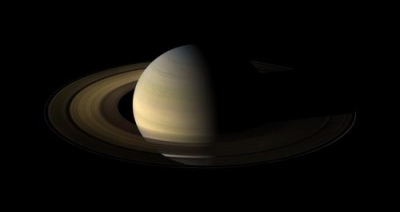Saturn Equinox Images from Cassini
The Cassini spacecraft, which entered orbit around Saturn on June 30, 2004 has successfully observed and recorded and sent back all sorts of data about seasonal changes on Saturn, as the planet experienced its equinox. The main NASA / JPL Cassini site is here.
Last month, on August 11, sunlight reaching Saturn hit the planet's rings edge-on, essentially making them disappear in the planet's equinox. Saturn has two equinoxes, much like Earth, during each of its "years" or orbits around the Sun. Each orbit takes 10, 759 Earth days, or 29.7 Earth years, so catching this equinox was a pretty big deal. There's a good video here explaining, exactly, what's happening to cause the equinox.

